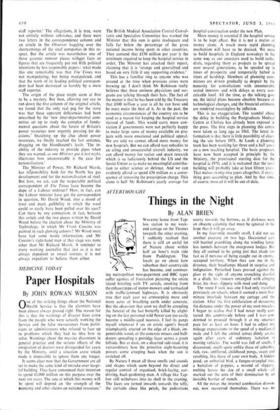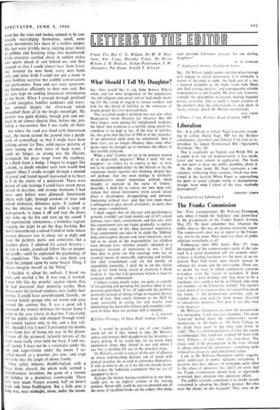AFTERTHOUGHT Things in the Night
By ALAN BRIEN
WALKING home from Tap- low station to my week- end cottage on the Thames towpath the other evening, I suddenly realised that there is still an awful lot of Nature about within half an hour's train ride from Paddington. The locals go on about how suburban their countryside.- has become, and commut- ing metropolitan newspapermen and BBC types suffer agonies of frustration picturing the entire island bristling with TV aerials, smoking from the exhaust pipes of motor-mowers and tarmacked with traffic-jammed highways. It is obviously true that each year we armourplate more and more acres of breathing earth under concrete. But the obsession that soon we shall be attending the funeral of the last butterfly killed by alight- ing on the last poisoned wild flower can too easily become a middle-aged neurosis. I feel its pangs myself whenever I see an estate agent's board triumphantly erected on the edge of a black, im- penetrable wood, or the concrete mixers and bull- dozers spreading a porridgy layer across a green hillside. But at dusk, on a deserted side-road, it is extraordinary how the primitive night-haunting powers come creeping back when the sun is switched off.
By Nature I mean all those smells and sounds and shapes which seem beyond the direct and regular control of organised, brick-laying, car- driving, back-gardening man. A village like Tap- low still withdraws into its shell in the evening. The faces are turned inwards towards the telly; the curtains close like petals, the pedestrians , scurry towards the burrow, as if darkness were an obscene calamity that must be ignored in the hope that it will go away.
In my four-mile moonlit stroll, I did not see another creature on two legs. Occasional cars still hurtled grumbling along the winding lamp- less tunnels between the overgrown hedges. But they all seemed to be going just that shade too fast as if nervous of being caught out in enern1.- occupied territory. When they saw me in the distance, their headlamps blazed in surprise and indignation. Perturbed faces pressed against the glass at the sight of anyone crouching dazzled in a ditch, his trousers entangled with clinging briar, his shoes slippery with mud and dung.
The route T took was one I had only travelled previously on wheels, when it seemed a mere five- minute interlude between my cottage and the station. After the first exhilaration of devouring the distance under the power of my own muscles. I began to realise that I had never really con- tacted this countryside before and I was con- demned to proceed through it at my smartest pace for at least an hour. I had to adjust my mileage expectations to the speed of a mediaeval mule and I felt the animal senses dimly awake again after years of sedentary isolation in moving vehicles. The world was full of smells, 1 discovered, smells quite unlike those of suburbia, rich, raw, unfiltered, childhood pongs, sweet and revolting, like those of your own body. A hidden pond, an unburied bird, a fungus-strangled tree. a battalion of poppies, a mound of slippery. melting leaves the size of a small whale-- all marked out the area of their domination by an invisible barrier of stench.
All the noises the internal combustion drowns out, now reasserted themselves. There was no
wind but the trees and bushes seemed to be con- tinually rearranging themselves, small, auto- matic movements like those of a restless sleeper.
My feet were terribly noisy, kicking great shoals of pebbles and breaking twigs into matchwood: Little creatures scuttled about in sudden rushes and spurts ahead of and behind me, and then stopped so that I could almost hear them listen- ing. Around the next bend, every next bend, owls and other birds I could not put a name to were holding secretive but audible conversations and parliaments. Nose and ears were accustom- ing themselves efficiently to their new task. But my eyes kept on sending inaccurate information to the brain. When I crossed through parkland" I could recognise familiar paddocks and every- day animals despite the silverwash which enamelled them all in the bright moonlight. My shadow was quite distinct, though pale and out- lined in an almost electric blue, before me, pro- viding a reassurance that I was really all there.
But where the road was lined with interwoven trees, the moon turned the ground into a patch- work of camouflage so that I might have been walking across ice floes, solid jigsaw patterns of white resting on dark veins of deep water. I could no longer, so strong was the illusion, distinguish the grass verge from the roadway, or a ditch from A hedge. I began to stagger like a drunk, to doubt whether each foot would find support. Once I strode straight through a mound of gravel and found myself marooned in its heart as if in the centre of a quicksand. There were dozens of side turnings I could have sworn never existed in daytime, and strange mansions I had never seen before were glimpsed, luxuriously ablaze with light, through cordons of trees and behind elaborate, defensive gates. It seemed at first the obvious way to deal with a siege of undergrowth, to fence it off and lock the doors and stoke up the fire and turn up the sound. I felt unprotected, anonymous, a homeless vagrant trudging the night to set the dogs barking. But then I remembered a school friend of mine whose greatest pleasure was to sneak out at night and roam the gardens, parks and cemeteries like a sleepless ghost. I admired his casual bravery— he was a weedy, jaundiced fellow like an unspot- ted giraffe—until he explained the psychology of his expeditions. 'The trouble is you think you might be jumped upon by some beserk Thing. I always imagine myself as the Thing.'
I decided to adopt his outlook. I bared my teeth and snarled a bit. It was true, it worked. I now felt like the prowler against whom they all had shuttered their domestic castles. How flimsy were the latticed windows, how feeble their palings. I could have eavesdropped, literally, on a dozen family groups who sat warm. and cozy around the summer fire. It was a good job I exercised my mental defences for nearer home I came to the area where, in daytime. I invariably left the public paths and plunged through wind- ing tunnels known only to me, and a few rab- bits. Should I risk it now? I pretended my doubts came from fear of losing my way in the gloom. I knew all the primeval, infantile terrors of the night were really what held me back. I told my- self sternly I must not be a rationalist under the sun and superstitious under the moon. I en- rolled myself as a poacher, pro tern., and crept furtively into the jungle of ebony fronds.
Once safely indoors, double-locked, with a large drink aboard, the whole walk seemed a melodramatic invention, the game of a townee on holiday in a dormitory countryside. There isn't very much Nature around, half an hour's train ride from Paddington. But a little goes a long way, near midnight, aline, under the moon.



































 Previous page
Previous page